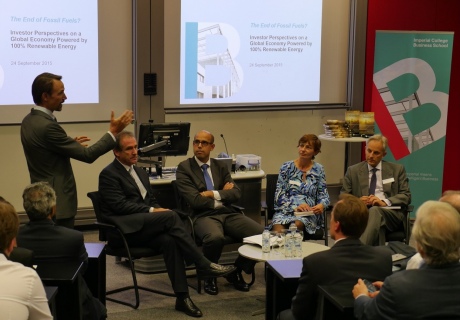The end of fossil fuels? Investors debate the future of renewable energy

Investors, staff and students gathered at the Business School last week to debate the financial issues surrounding renewable energy.
The panel debate, chaired by BBC journalist Rob Broomby, looked at whether renewable energy can grow from the current global annual investment of $250 billion to $1 trillion over the coming years and asked whether the renewable sector is now a safe bet for investors.
The themes of the discussion were based around a new book, Renewable Energy Finance: Powering the Future by Dr Charles Donovan, Principal Teaching Fellow at the Business School and a former BP executive. The book reveals how putting the brakes on climate change is no longer a question of science and technology, but depends on the deployment of financial and political resources.
The discussion was led by pannellists including Louise Wilson, Managing Director of Abundance Generation, an organisation that enables people to invest in UK renewable energy projects; Chris Hunt, Managing Director of energy investment company Riverstone; Alejandro Ciruelos, Executive Director of Project and Acquisition Finance, Santander and Alexandre Chavarot, Partner, Access Corporate Finance.

Dr Charles Donovan began by stressing how renewable energy needs to become a ‘mainstream prospect’ with a global shift towards using 100 percent renewable energy in the near future instead of countries depending on conventional fuels that have harmful effects.
The discussion addressed a range of topics including the impact of the financial crisis on the regulation of renewable energy, a look at the comparative costs of renewables between countries and the gap in funding of the renewable sector compared to other forms of energy.
The discussion then moved on to the rise of crowdfunding as a potential means of green investment. On this topic, Louise Wilson said that although ‘crowdfunding is currently seen as niche, it won’t be in the future’.
The audience were then invited to ask questions, resulting in a lively discussion on topics such as to what extent energy should be subsidised by the government, the crowdfunding of renewables in developing countries and whether or not investment banks should take a risk on renewables.
Martin Siegert, Co-Director of the Grantham Institute concluded the event by praising the Business School’s awareness of the challenges posed by climate change which is reflected in the new MSc Climate Change, Management and Finance. The new programme will be launched at a special talk given by Nick Stern at the Business School on 13 October. In drawing the event to a close he stressed how climate change will have an impact on our lives 'in the next 50 years and how we need people with the skills to address the change that’s coming’.
Article text (excluding photos or graphics) © Imperial College London.
Photos and graphics subject to third party copyright used with permission or © Imperial College London.
Reporter
Laura Singleton
Communications Division